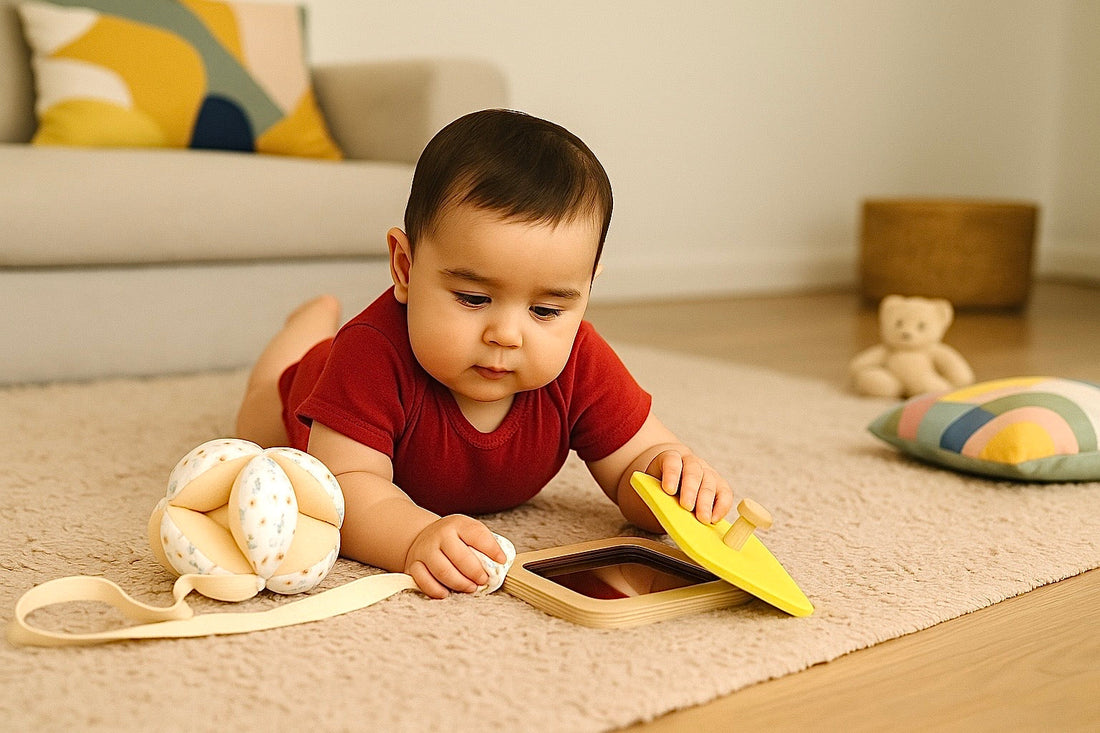
My baby doesn't play alone: is this normal? And how can I encourage him?
When you become a parent, you often dream of seeing your baby play quietly, alone, and completely independent. But in reality, many babies rarely play alone ... and that's perfectly normal. Don't panic: this is neither a sign of delay nor an educational failure. It's a stage of development, and there are simple ways to support it.
Why doesn't my baby play alone?
Babies have a fundamental need for connection. Until 12 or even 18 months, their main way of exploring the world is through you : your gestures, your voice, your presence. Independent play only develops gradually, depending on:
- of their cognitive and motor maturity,
- of their emotional security (playing alone means accepting being temporarily separated),
- and age-appropriate exploration opportunities.
Bottom line: If your baby isn't playing alone, it's not a problem. It's just that they might not be there yet.
At what age can a baby start playing alone?
As early as 6 months, a baby may have short periods of solitary attention. This might be 2 or 3 minutes spent observing an object, touching a texture, or manipulating a toy.
Between 12 and 18 months, the moments of solo play gradually lengthen, but often remain interspersed with emotional back-and-forths with the adult.
On average, we observe a real start of independent play around 18-24 months.
How to encourage your baby to play alone?
Here are some effective (and caring) keys to helping your baby become more independent in play:
1. Give him a safe and minimalist space
A tidy environment, without too much stimulation, helps children concentrate. Choose a few well-chosen toys instead of a jumble of objects.
2. Offer age-appropriate games
If the game is too complex, your baby will become discouraged. If it's too simple, he'll lose interest. That's why it's important to select toys that match his developmental stage.
This is exactly what Noor & Koala offers with its age-specific boxes: so that each moment of play meets the baby's real needs.
3. Be present… without intervening
Sit near your child without necessarily playing with them. Your mere presence is reassuring. Little by little, you can gently move away.
4. Make the most of his concentration time
When your child plays alone, even briefly, gently point out:
“You observed this toy well! You concentrated for a long time.”
This builds pride and encourages repetition.
5. Incorporate a self-play ritual
Every day, offer a quiet time for free play at the same time. The framework and repetition encourage independence.
In conclusion
If your baby doesn't play alone, there's no need to feel guilty. Every child has their own pace, and independence is built gradually. By supporting them with kindness, clear routines, and well-chosen games, you'll help them develop their concentration, confidence, and enjoyment of playing alone.
And if you're looking for age-appropriate games for your baby, already gathered for you, discover our evolving, bilingual, Montessori-inspired boxes — designed to encourage development while respecting each child's rhythm 🐨
